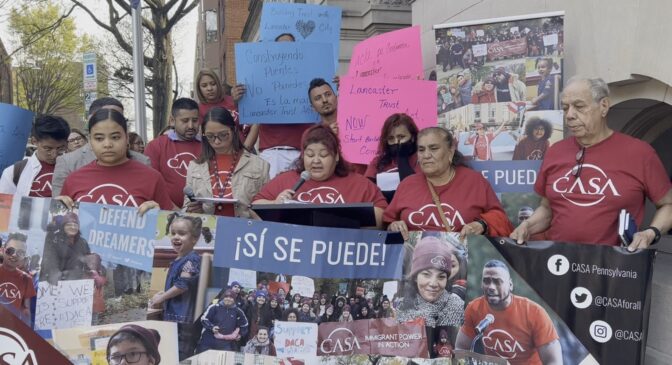
Lancaster City Hall is seen in this photo taken Aug. 5, 2019.
Ian Sterling for WITF

Lancaster City Hall is seen in this photo taken Aug. 5, 2019.
Ian Sterling for WITF

Ian Sterling for WITF
Lancaster City Hall is seen in this photo taken Aug. 5, 2019.
Immigration advocates and Lancaster City council members are rallying for legislation that would prohibit local police and city officials from sharing information with U.S. Immigration and Customs Enforcement.
On Tuesday night Lancaster City Council approved a motion to discuss the Trust Act at their next meeting on April 25. Lancaster Online reports that a potential vote is not likely to happen until the following meeting on May 9.
The potential ordinance, which is still not a bill that has been introduced in Lancaster City Council, would be called the Lancaster Trust Act. According to an unofficial draft bill that includes recommendations from CASA Pennsylvania, an immigration advocacy group, the Lancaster Trust Act would establish that the city does not intervene in federal immigration matters or collaborate with ICE. It would prohibit any city official or employee from inquiring about immigration status, and it would also preclude the city from retaining information related to an individual’s citizenship or immigration status, unless required to do so by federal law, state law or court order.
CASA’s Campaign Communications Specialist, Lesley Paredes, said CASA is still awaiting a response from the city’s solicitor regarding the draft bill language they submitted.
“We do not know if this will be the final language since it will have to be reviewed,” Paredes said.
Lancaster City is part of a Welcoming City program, which is a status designated by a Georgia nonprofit called Welcoming America. Cities become “welcoming cities” when they implement policies that support and protect immigrant communities. But proponents of the Lancaster Trust Act want protections for immigrants codified into law.
Philadelphia, which also has a “Welcoming City” designation, has its own law that prohibits collaboration between ICE and city officials – though it’s not called a Trust Act.
“Cities with Trust Acts have lower crime rates and unemployment rates as well as higher household incomes, with the smallest populations seeing the most pronounced effects. Most importantly, families won’t suffer from the terror of detention and deportation,” said Daniel Alvalle, state director of CASA in Pennsylvania.

Courtesy of Leslie Paredes / CASA
CASA member Gabriela Guzman recounts how her husband was stopped by ICE.
Councilwoman Janet Diaz said a potential Trust Act in Lancaster would make undocumented people feel safer about reporting crimes or any potential abuses from landlords.
“We would like to improve public safety for all residents and provide assurance in immigrant communities to report crime without fear that information is shared with ICE,” Diaz said.
Diaz said she also supports a Lancaster Trust Act because she has received calls from constituents who are looking for loved ones detained by ICE.
“For us to say that it’s a welcoming city – yeah, sure. We welcome everybody,” Diaz said. “But at the same token, why are they getting detained?”
In Tuesday night’s Lancaster City council meeting, Mayor Danene Sorace said the city already has an “internal policy” that prohibits police from sharing information with Immigration and Customs Enforcement. That policy was enacted in 2018, but it has not been made public.
At a press event held in front of Lancaster City Hall on Tuesday, CASA members shared testimonies of loved ones being stopped by police and questioned about their immigration status.
“My family, like so many in Lancaster, need to feel safe walking the streets and heading to work. I need to be sure that if I am in danger, I can call the police, and they will protect me,” said Gabriela Guzman, a CASA member.
Another CASA Member Guadalupe Almazan recounted her son’s interactions with police officers after a deer jumped in front of his vehicle.
“When the police arrived, instead of asking him how he felt or if he had any injuries from the accident, they just put him in the patrol car and took him away. That’s where his ordeal began: Instead of helping him, the Lancaster police arrested him. He was taken to jail, and the jail turned him over to ICE agents,” Almazan said. “Now he is fighting deportation from the country he has lived in since the 7th grade.”

Sometimes, your mornings are just too busy to catch the news beyond a headline or two. Don’t worry. The Morning Agenda has got your back. Each weekday morning, host Tim Lambert will keep you informed, amused, enlightened and up-to-date on what’s happening in central Pennsylvania and the rest of this great commonwealth.
The days of journalism’s one-way street of simply producing stories for the public have long been over. Now, it’s time to find better ways to interact with you and ensure we meet your high standards of what a credible media organization should be.